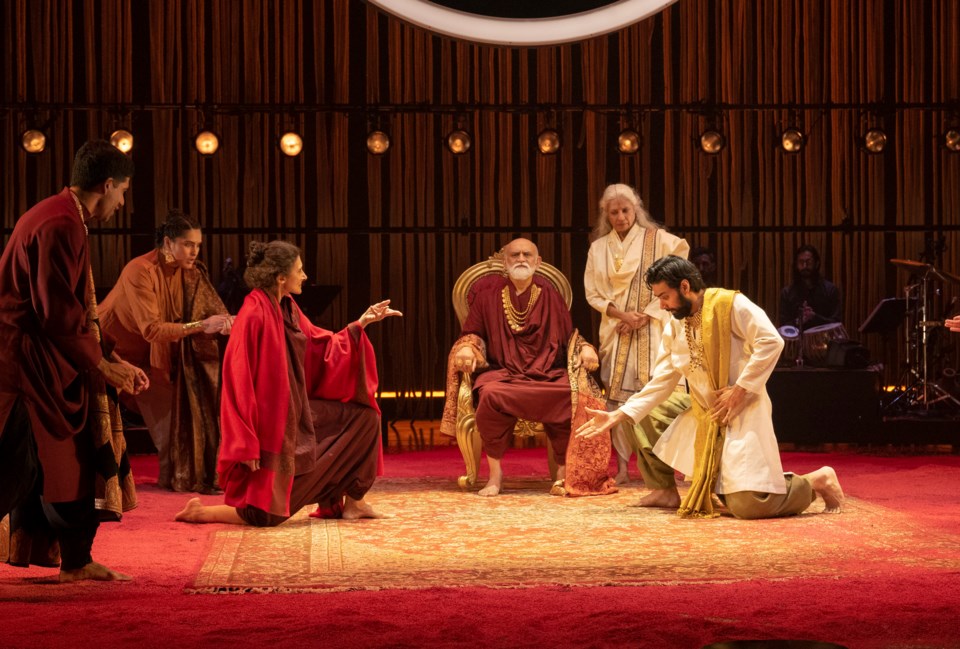With two distinct parts and running almost five hours, plus an optional 70 minute Khana community meal in between, Shaw Festival’s presentation of Mahabharata admittedly takes some commitment.
But this ground-breaking production is worth every second. It’s like nothing that has come before it in the festival’s previous 60 years.
The adaptation of the 4,000-year-old Sanskrit epic poem is a production of Toronto’s Why Not Theatre, in association with Barbican, London and commissioned and presented by the Shaw Festival. It realizes a dream that Shaw artistic director Tim Carroll has had since taking over the reins of the local company in 2017.
Avid Shaw theatregoers most likely won’t recognize many faces on stage, as all but one of the actors are newcomers and not part of the usual Shaw ensemble. And fittingly, for a production that uses as source material one of the foundational epics of India, the cast and creative team are all from the South Asian diaspora and hail from around the world.
Mahabharata is visually and aurally stunning. It’s a feast of storytelling, song and dance, presented in two distinctly different parts: Karma - The Life We Inherit and Dharma - The Life We Choose.
The curtain rises for Karma, revealing a sparsely decorated stage, a circle of red sand its lone adornment, with a curtain of thick ropes hanging from the catwalk. Six musicians are arranged around the back of the circle, providing a constantly throbbing, droning soundtrack with a mixture of exotic and more familiar modern instruments throughout the two-and-a-half-hour Karma.
Miriam Fernandes steps to the front of the stage as the storyteller, engaging the audience while narrating the saga of two families, the Pandavas and Kauravas, at war with one another through generation after generation. As tensions mount and hatred is passed down repeatedly from parent to child, war breaks out and tragedy ensues.
Part One is set in a dense, uninhabited forest, but Fernandes promises that in the heart of that forest flows a river of wisdom.
Having co-written the adaptation with director Ravi Jain, Fernandes is a natural as the narrator, so much so that the audience engages with her as much as it does the actors behind her. And in a tale with many characters through many generations, her interjections are essential in understanding the connections between the characters.
As Fernandes explained during the Khana dinner, the nature of The Mahabharata itself is a series of stories passed down from generation to generation, often in a setting much like the Khana.
Fernandes was joined at the Khana by artistic associate Sharada K. Eswar, who did the text adaptation of the epic. Fernandes joked that Eswar was like her aunt, though Eswar insisted she was more like an older sister. The pair delved deeply into the philosophical riddles from The Mahabharata, told to each of the women by their own families as they were growing up.
Eswar pondered the omission from the production of some of the stories from the Hindu epic, such as that of the Yaksha, a nature spirit who can be either benevolent or mischievous. As Fernandes explained, the sheer magnitude of The Mahabharata is such that omissions were necessary to create an adaptation that busy people would be willing to attend. After all, the previous production of the epic by Peter Brooks in 1985 was nine hours long.
While enjoying a delicious vegetarian meal of tarka daal, aloo gobhi, mutter paneer, roti and basmati rice catered by Markham’s Jaisa Kitchen, the audience learned more about the concepts of Karma, Dharma and Jai. The laid-back, friendly atmosphere of the Kahna proved essential to a deeper understanding of what went on in the first part of the play and what was to come that evening.
Even so, nothing could have fully prepared the audience for the spectacle that is Dharma, the second two and a half hours of Mahabharata.
The sparse stage is replaced by what seems to be the interior of a more modern home, with a giant video screen backdrop featuring projections designed by Hana S. Kim and Ann Slote. The artful video projections, with audio, provided a stark contrast, bridging the ancient, traditional elements of the story to modern, present times.
Neil D’Souza shines during Dharma as Krishna, the eighth avatar of the Hindu god Vishnu and a supreme god in his own right. D’Souza brings a wry sense of humour to the important role of advisor to the Pandava clan’s Arjuna, portrayed by Anaka Maharah-Sandhu.
Part Two also includes an original Sanskrit operatic adaptation of The Bhagavad Gita, the most renowned, influential and significant passage of The Mahabharata. London, Ontario soprano Meher Pavri, 2007’s Miss India Canada, takes the spotlight with her powerful voice in a show stopping performance here.
The battle between the Pandavas and Kauravas takes place in Part Two, resulting in destruction, devastation and loss. During the battle, the dance by Jay Emmanuel as Shiva, with brightly painted face and flowing dreadlocks sweeping across his body, poetically emphasizes the violence.
The Pandavas emerge from the battle victorious, yet the question remains, what have they actually won? Or, perhaps, as Yudhishthira, played by Shawn Ahmed, finds out when he ascends into heaven, maybe they haven’t really won anything at all.
This skilful production of Mahabharata hits like a hammer on some of the most important questions of life itself. Within the two separate performances are lessons about humanity and much of the philosophy and spirituality of Hindu culture.
One audience member of South Asian descent remarked to The Local how amazed she was to see her culture and traditional lore on display and performed so magnificently right here in Niagara-on-the-Lake.
It’s a once-in-a-lifetime experience, running only until March 26 at the Shaw Festival Theatre. After that, Why Not Theatre takes Mahabharata on a world-wide tour. See it, all of it, between now and then. Visit shawfest.com for show times and tickets.
